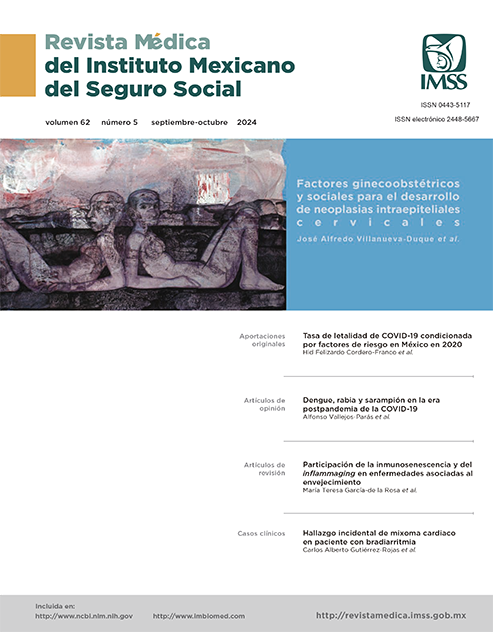Perceived stress in Mexican patients newly diagnosed with breast cancer
Main Article Content
Keywords
Abstract
Background: Cancer diagnosis has been described as a significant factor causing psychological stress, which may increase a vulnerability to develop psychological disorders, decrease quality of life levels and affect the response to cancer treatment.
Objective: To validate the Newly Diagnosed Breast Cancer Stress Scale (NDBCSS) and to explore the differences concerning clinical and sociodemographic variables.
Material and methods: Cross-sectional study. Patients recently diagnosed with breast cancer on the day they received the definitive cancer diagnosis were invited to participate. The Perceived Stress Scale (PSS) and the NDBCSS were completed; the latter previously underwent a validation process into Spanish (reliability, content validity, structure —EFA— and convergent validity).
Results: 176 patients participated; their mean age was of 52.8 years. The scale obtained a content validity of 0.53 and reliability of 0.791; the EFA showed 2 factors explaining 42.31% of the variance. Stress levels were 23.05 (PSS) and 13.2 (NDBCSS). Concern about side effects, the progression of the illness and the lack of information were reported as the most critical stressors for these patients.
Conclusions: The NDBCSS showed acceptable psychometric properties for its application in Mexican patients and probably for patients with similar personal characteristics and linguistic and cultural contexts. Based on the results, it is possible to design precise interventions addressed to the stressors they face, such as the impact of the disease and the treatment.
References
Ferlay J, Ervik M, Lam F, et al. Global Cancer Observatory: Cancer Today. Lyon, France: International Agency for Research on Cancer; 2020. Disponible en: https://gco.iarc.fr/today.
Civilotti C, Botto R, Maran DA, et al. Anxiety and depression in women newly diagnosed with breast cancer and waiting for surgery: Prevalence and associations with Socio-demographic variables. Medicina (Kaunas). 2021;57(5):454. doi: 10.3390/medicina57050454.
(espacio)Zhou K, Ning F, Wang X, et al. Perceived social support and coping style as mediators between resilience and health-related quality of life in women newly diagnosed with breast cancer: a cross-sectional study. BMC Womens Health. 2022;22(1):198. doi: 10.1186/s12905-022-01783-1.
Liu Y, Han Y, Wang X, et al. Psychometric properties of the Chinese version of the Courtauld Emotional Control Scale in women newly diagnosed with breast cancer. Qual Life Res. 2022;31(3):865-76. doi: 10.1007/s11136-021-02953-8.
Groarke A, Curtis R, Groarke JM, et al. Post-traumatic growth in breast cancer: how and when do distress and stress contribute? Psychooncology. 2017;26(7):967-74. doi: 10.1002/pon.4243.
Dinapoli L, Colloca G, Di Capua B, et al. Psychological Aspects to Consider in Breast Cancer Diagnosis and Treatment. Curr Oncol Rep. 2021;23(3):38. doi: 10.1007/s11912-021-01049-3.
Capewell C, Ralph S, Symonds M. Listening to Women´s Voices: Using an Adapted Photovoice Methodology to Access Their Emotional Responses to Diagnosis and Treatment of Breast Cancer. J Patient Exp. 2020; 7(6):1316-23. doi: 10.1177/2374373520930463.
Bahri N, Fathi Najafi T, Homaei Shandiz F, et al. The relation between stressful life events and breast cancer: a systematic review and meta-analysis of cohort studies. Breast Cancer Res Treat. 2019;176(1):53-61. doi: 10.1007/s10549-019-05231-x.
Wu Y, Zhou L, Zhang X, et al. Psychological distress and eustress in cancer and cancer treatment: Advances and perspectives. Sci Adv. 2022;8(47): eabq7982. doi: 10.1126/sciadv.abq7982.
Bowen DJ, Fernandez Poole S, White M, et al. The role of stress in breast cancer incidence: Risk factors, interventions, and directions for the future. Int J Environ Res Public Health. 2021;18(4):1871. doi: 10.3390/ijerph18041871.
Cohen S, Kamarck T, Mermelstein R. A global measure of perceived stress. J Health Soc Behav. 1983;24(4):385-96. doi: 10.2307/2136404.
(espacio)Lee TY, Chen HH, Yeh ML, et al. Measuring reliability and validity of a newly developed stress instrument: Newly Diagnosed Breast Cancer Stress Scale. J Clin Nurs. 2013;22(17-18):2417-25. doi: 10.1111/jocn.12107.
Ministerio de Asuntos Exteriores, Unión Europea y Cooperación. El español en el mundo. Madrid: Dirección General de Comunicación, Diplomacia Pública y Redes; [sin fecha de publicación]. Disponible en: https://www.exteriores.gob.es/es/PoliticaExterior/Paginas/ElEspanolEnElMundo.aspx#:~:text=Con%20casi%20493%20millones%20de,m%C3%A1s%20utilizada%20en%20la%20red
González MT, Landero R. Factor structure of the Perceived Stress Scale (PSS) in a sample from Mexico. Span J Psychol. 2007;10(1):199-206. doi: 10.1017/s1138741600006466.
(espacio)Cull A, Sprangers M, Bjordal K, et al. EORTC Quality of Life Group Translation Procedure. Brussels: EORTC Publications; 2002.
Urrutia M, Barrios S, Gutiérrez M, et al. Métodos óptimos para determinar validez de contenido. Educación Médica Superior. 2014;28(3):547-58.
Furr RM, Bacharach VR. Psychometrics. An Introduction. 2th ed. California: SAGE Publications; 2014.
(espacio)Charalampopoulou M, Syrigos K, Filopoulos E, et al. Reliability and validity of the Newly Diagnosed Breast Cancer Stress Scale in the Greek population. J Mol Biochem. 2020;9:5-12.
(espacio)Lee TY, Hsing SC, Li CC. An improved stress-scale specifically designed to measure stress of women with newly diagnosed breast cancer. Int J Environ Res Public Health. 2021;18(5):2346. doi: 10.3390/ijerph18052346.
(espacio)Ventura-León J. Dos formas fáciles de interpretar las famosas cargas factoriales. Gac Sanit. 2019;33(6):599. doi: 10.1016/j.gaceta.2019.04.002.
Unger-Saldaña K, Contreras-Manzano A, Lamadrid-Figueroa H, et al. Reduction in the treatment gap for breast cancer in Mexico under Seguro Popular, 2007 to 2016. Health Syst Reform. 2022;8(1):e2064794. doi: 10.1080/23288604.2022.2064794.
Gálvez-Hernández CL, Rivera-Fong L, Mohar-Betancourt A, et al. Factor structure and reliability of MOS social Support survey among Mexican women with Breast Cancer. Acta Investig Psicol. 2020;10(3):44-53. doi: 10.22201/fpsi.20074719e.2020.3.356.
Gálvez-Hernández CL, Boyes A, Ortega-Mondragón A, et al. Unmet Needs Among Breast Cancer Patients in a Developing Country and Supportive Care Needs Survey Validation. Rev Invest Clín. 2021;73(4):245-50. doi: 10.24875/ric.21000068.


